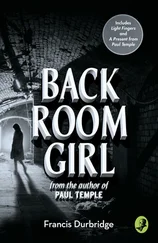But Hiren-babu seemed to have lost his enthusiasm for storytelling. He stared outside through the window, while Mona Lisa sat on a chair and plucked at the tablecloth aimlessly.
I entreated him, “Please tell me the rest!”
“Not now.”
I sat on the bed and, leafing through an English book, remarked, “I’ve read this. Very interesting.”
Hiren-babu suddenly rose and said, “This one’s very interesting too. Why don’t you take it home and read it, I’ll take a quick nap. All right?”
I didn’t say anything and went out slowly; I felt, through my back, the door being closed. I didn’t return home, I sat down exactly where she had been sitting on the veranda. The comb with the scent of her hair was still lying there, I picked it up and ran my fingers over its teeth repeatedly.
One more day, one more day. The day of departure came, was postponed, another day, another. And then they left.
This time there was a letter, one letter for the three of us, in a thick blue envelope, addressed to me, this time. I wrote the reply for all of us, a little on the long side, and a poem as well, which I didn’t send. The letters came to an end soon, from both sides, and all I wrote was poetry.
We got all the news from Mrs. Dey. They were well, very well. Hiren had bought a car, they had made a trip to Asansol. The talkies had come to Calcutta, tomatoes were dear, but winter had suddenly receded, one hoped there would be no illness. As soon as it got a little warmer they’d be going to Darjeeling.
I started seeing, in my mind, images of Darjeeling, a place I’d never seen, but Mrs. Dey dispelled them one day, saying, “They’re coming.”
Coming! Here! To Dhaka! Why, what happened to Darjeeling?
Answering our unasked question, Mrs. Dey said, “She’s not well, she’s going to stay with me now.”
“Ill again?” All three of us were startled.
“Not ill exactly, not very well, that’s all,” Mrs. Dey smiled slightly.
We felt very disturbed. Disturbed by her voice, her smile. Not well, but not ill — what was going on? Yet Mrs. Dey was serene and complacent, she appeared to be pleased with the news. We felt quite angry, really.
The three of us turned up within an hour of their arrival. Mona Lisa was leaning back on the sofa, a cigarette tin in her hand. We looked at one another — had Hiren-babu’s behavior driven her to take up smoking?
She smiled faintly upon seeing us, didn’t say anything.
“How are you, Mona Lisa?” We tried to set a light tone to our reunion.
Bringing the cigarette tin close to her face, she touched it with her mouth and closed the lid, saying, “Well. .”
“Are you unwell?”
Without replying, she said, “What news?” Then she started talking of this and that, frequently raising the tin to her mouth.
Hiren-babu entered and said to her, eagerly, “Toru, how are you feeling now?”
Raising tired eyes, she said, “Fine.”
“Why don’t you lie down for a while?”
“No, I’m fine as I am.”
“Ah, you boys are here. Toru here has. .” Hiren-babu stopped abruptly.
“What’s the matter with her?”
“Nothing, but. .”
But what? Had she got some dreadful disease that couldn’t be talked about with anyone else? And she seemed to have changed, didn’t even laugh wholeheartedly when she wanted to. Our mothers had always told us girls became healthier after marriage, but what had happened to our Mona Lisa?
Mrs. Dey brought her a small plate and said, “Try this, will you?”
“What is it, Ma?”
“Try it and see.” She took a little on her finger and pushed it into her daughter’s mouth.
“No, no, no more.” Lines of discomfort were etched on her face; she put her hand to her throat and lowered her face.
We walked without speaking for a while after we came out, feeling rather depressed. Asit broke our silence. “She was spitting into that cigarette tin.”
“What?” I was shocked.
“Really! I saw!”
I looked for an explanation. “That must be part of her illness then.”
“She’s not ill.” Asit said solemnly. “She’s going to have a baby.”
Hitangshu chuckled in response. “Why are you laughing?” I asked him, angrily. “What are you laughing at?”
Asit said, “That’s why her mother brought her that green mango mixture. People in her condition like sour things.”
“You know everything,” I roared in rage.
“What’s the matter with you?” Asit looked at me, in apparent amusement.
“Leave me alone. I hate it, I’m going home.”
I deserted them and went home, sitting down to write poetry in the twilight, solitary.
Hiren-babu went back in two days. His train left in the afternoon. The luggage was placed in the horse-drawn carriage. Hiren-babu stopped as he was about to get in. “Did you leave something behind? Should I go get it?” I said quickly.
“No, I’ll go myself.”
He went in with quick steps, then returned and got into the carriage without looking to his left or right. The horseman cracked his whip. Asit craned his neck, “When are you coming again?”
“I’ll be coming. Look after her,” said Hiren-babu and turned away. My heart cried out.
How silent that afternoon, how picturesquely beautiful, back in the March of 1928, in old Paltan. The carriage became smaller and smaller, and disappeared around the bend of the road. We went inside. Mona Lisa was crying into her pillow, her body racked with sobs.
“Mona Lisa!”
“Listen, listen to us now.”
“Hiren-babu will come again. .”
“Next time we simply won’t let him go.”
“Don’t cry, don’t cry anymore, Mona Lisa.”
The tears didn’t stop. I knelt on the floor next to her, put my hand on her head and said, “Quiet now, quiet now, Mona Lisa.” As I spoke, my voice broke too and I had tears in my eyes.
Mona Lisa pushed me away after a few minutes and said, “Hey — why are you crying? Silly!” Grabbing my hair, she shook me and said, “You’re a man — aren’t you ashamed to cry? Stop immediately.”
I raised my face. The moment our eyes met there was a tremor in my breast, and smaller tremors continued all day, I couldn’t forget even in my sleep.
The three of us surrounded her. So that she could be well, happy, never feel upset. If she suddenly felt the whim to eat something out of the ordinary, Asit scoured the city to fetch it. That she would lose the desire to have it as soon as she saw it was well known by now, but we lived in the hope of her new desires. And if ever she did eat something, and liked it, we were over the moon with happiness.
Hiren-babu returned after three months. By then Toru’s health was much improved; she was eating, going out, buying new clothes from peddlers, looked fuller. This time Hiren-babu stayed for ten days, and then again during the Durga Puja vacation.
But by then her condition was deteriorating again. The doctor visited frequently, prescribed medicines, but from what we could hear, none of it was working. We didn’t know why she was suffering, didn’t understand it, but we could see its effect for ourselves — she had dark circles under her eyes, she was out of breath after a sentence or two, her face sometimes blue. We hovered nearby, fanned her when she lay down, tried to amuse her when she seemed well, but never succeeded.
One day I said, “Babar took on Humayun’s illness, how nice it would be if something like that could be done.”
Asit burst out in laughter. “Whatever else you can do, you cannot take on this illness of hers.”
I reddened and said, “Not the illness, but the suffering.”
Hitangshu said, “Really, how she’s suffering. She paces up and down all night, apparently — just can’t sleep. It even hurts to lie down.”
Читать дальше












